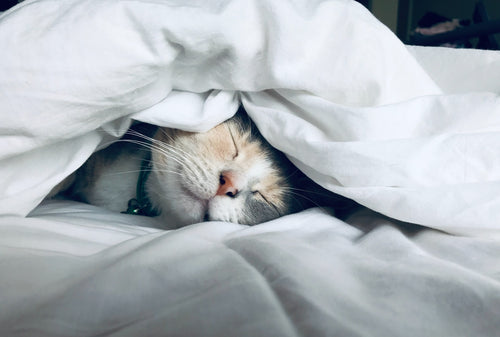You’re Exhausted Because You Were Never Meant to Live Like This

Every morning, we wake up tired and grumpy, our bodies achy and our minds foggy, to face a world that feels like it’s closing in from all sides. We down our coffee, build up our courage, and jump into the chaos of the modern world. The hours blur together as we rush from task to task. Traffic jams test our patience, the to-do list becomes longer, the notifications on our phone keep beeping, and somewhere between it all, we forget to breathe. In the evening, we collapse into bed, too tired to think, only to do it all over again the next day. This is the cycle: endless, numbing, and extremely unfulfilling.
We are exhausted, not because we are lazy, undisciplined, or ungrateful, but because the world we have built was never meant to care for us. The systems, technologies, and expectations we have created are fundamentally incompatible with being human.

The Grind That Never Ends
Productivity has become the altar we worship at. Work harder, produce more, and don't ever dare slow down. What was once a nine-to-five is now a 24/7 grind, where fewer people do more work while the richest among us hoard all the resources. Each year, teams shrink due to the “no budget” story, yet there is always money for expensive executive bonuses. You are expected to do the work of three people and still be grateful for the opportunity.
When we dedicate everything to our job, there is nothing left for our own life, or for the people we care about. Exhaustion has become normalized, even celebrated. The culture of overwork glorifies the people who drain every ounce of their energy in service to the system. Meanwhile, mass media blames the rise of social media and accuses it of making us self-centered and selfish. Like everything else, it avoids addressing the real issue and exposing the machine it serves: we are in survival mode. How can we pour into someone else’s cup when ours is completely empty? We can't even afford to be social anymore.
This isn’t just capitalism at work; it’s a collective delusion. Even our free time has been colonized. Hobbies are side hustles. Rest is rebranded as productivity hacks. You are not relaxing; you are “boosting performance.” The truth is, the system isn’t broken. It’s doing exactly what it was built to do: to extract value from you until there is nothing left.
This culture of relentless productivity doesn’t just affect our mental and emotional health, it takes a physical toll as well. Our bodies, ancient machines wired for a different pace of life, are forced to adapt to the inhumane.

When Your Body Becomes Collateral Damage
Humans were not created to sit in offices for hours on end with fluorescent lights shining on them while they work. We were not made to work on caffeine and cortisol, getting six hours of sleep and do it all over again the next day. But here we are, doing it and trying to act like it’s normal.
Our bodies are ancient machines connected to the natural world, meant to rise with the sun, move freely, and sleep deeply. Instead, we are forcing them into a world that has no place for balance. Chronic fatigue? Insomnia? Digestive issues? Restlessness you can’t name? You are experiencing what happens when human beings are pushed to conform to the inhumane.
Modern life doesn’t just ignore your body’s needs; it actively works against them. You are exhausted and unhappy because the system was not created to help you grow. The solutions we are offered? Pills, apps, diets, band-aids on bullet wounds meant to keep you going.
The Blame Game
If you are exhausted, the system will tell you it’s your fault. You are not managing your time well enough. You're not taking care of yourself properly. You’re not hustling hard enough to build your dream life, meditating consistently enough, or optimizing your efficiency enough.
By making you think the problem is you, the system remains unchallenged. Your exhaustion isn’t caused by the never-ending demands and chaos of modern life. No, it’s because you are not trying hard enough, or so you are told. And we believe it because it’s easier to blame ourselves than to confront the fact that this world is designed to exploit us. A world that grinds us down and then blames us for breaking.
The system thrives on this narrative because it keeps you chasing an unattainable ideal for the rest of your life. Exhaustion becomes a sign that you are doing enough to earn your place in the world. But the truth is, no amount of effort will ever satisfy a machine that has been designed for endless growth. You are not supposed to win. You are supposed to keep running.

What We’ve Lost
In the middle of all this chaos, there’s something missing, something so simple, so fundamental, it almost feels strange to name it: stillness. The kind of stillness that comes from lying in a field and watching the clouds roll by, or sitting by a fire and letting your mind wander. The kind of stillness that isn’t punctuated by the need to be productive or entertained. But stillness is hard to come by these days. It’s like we have lost how to be alone with ourselves, and in losing that, we have lost something essential.
What We Were Meant For
People were supposed to wake up with the sun, work with their hands, connect with other people, and rest when the day is done. But it goes beyond that. We were supposed to be part of the natural world, to find meaning not in the constant striving, but in presence. Our bodies were created to move, to breathe deeply and to change with the flow of the seasons. Our minds were supposed to wander, to create, to solve problems not under pressure but through curiosity and collaboration.
We were supposed to feel the cool ground beneath our toes, to hear the wind making the leaves rustle, to taste food that was grown by the earth and with time. We were supposed to tell stories around a fire, to laugh until it rings in the night, to live a life that is not performed.
The Question Worth Asking
The question isn’t how to keep going in a system that wears you out. It’s whether the system itself is worth defending. If the price of participation is exhaustion, perhaps the better choice is to opt out - slowly, quietly, in ways that restore the humanity that has been lost.
This isn’t about abandoning responsibilities or idealizing a past that was not perfect. It’s about recognizing the cracks in the foundation and deciding, piece by piece, to build something better. A life that is in tune with the body, the mind and the soul.

A World Beyond Exhaustion
Imagining a different way of living feels radical, because it’s all we have ever known. It means questioning the systems we have created and the stories we have been told. It means considering whether progress is always worthwhile, whether convenience is always an improvement, whether maybe we don’t actually need more than we already have.
Taking back our lives has to be done slowly, deliberately. We have to take back the parts that we can control. This starts with paying attention to what we consume - what we buy, what we watch, what we allow in our mental and physical space. We need to have stronger boundaries between work and personal lives that reminds us that we are not defined solely by our productivity. We need to rest without guilt, without fear of missing out, and without comparing ourselves with others.
However, this path is not without its challenges. The system functions because there are individuals within it who haven’t yet woken up to the source of their misery. These individuals, still firmly caught up in the story of overwork and overconsumption, might think that you are strange, lazy, or even selfish for taking a break. They may try to push you to do the same, to do what they are also being pushed to do. In the most severe cases, they may even exclude you for attempting to challenge the established order.
A world beyond exhaustion isn’t an utopia. It is created by slow, intentional steps that bring people back to themselves and being human. Over time, those choices create a life where simply being is enough, and thriving becomes the norm.



